|
|
 |
Fiche d'espèce de Copépode |
|
|
Calanoida ( Ordre ) |
|
|
|
Clausocalanoidea ( Superfamille ) |
|
|
|
Euchaetidae ( Famille ) |
|
|
|
Euchaeta ( Genre ) |
|
|
| |
Euchaeta longicornis Giesbrecht, 1888 (F,M) | |
| | | | | | | Syn.: | Euchäta longicornis Giesbrecht, 1888; 1892 (p.246, 264, 772, Descr.F, figs.F);
Paraeuchaeta longicornis : Bradford & al., 1983 (p.35, 42, figs.F,M, Rem.); Heinrich, 1990 (p.17, 20: Rem.); Chihara & Murano, 1997 (p.801, Pl.105,111: F,M); in CalCOFI regional list (MDO, Nov. 2013; M. Ohman, comm. pers.);
Euchaeta longicauda : Park & Choi, 1997 (Appendix) | | | | Ref.: | | | Giesbrecht & Schmeil, 1898 (p.40, Rem. F); A. Scott, 1909 (p.66); Farran, 1929 (p.208, 238, Rem.); 1936 a (p.89); Mori, 1937 (1964) (p.45, figs.F); C.B. Wilson, 1950 (p.212, figs.F,M); Chiba & al., 1957 a (p.11); Tanaka, 1958 (p.328); Grice, 1962 (p.203, figs.F,M, Rem.); Chen & Zhang, 1965 (p.55, figs.F); Tanaka & Omori, 1968 (p.220); Tanaka, 1973 (p.133, figs.F,M); Chen & Shen, 1974 (p.126, figs.M); Tranter, 1977 (p.596, 598); Zheng & al., 1982 (p.36, figs.F); Park, 1995 (p.20, Redescr.F,M, figs.); Conway & al., 2003 (p.187, figs.F,M, Rem.); Mulyadi, 2004 (p.69, figs.F, Rem.); Jeong & al., 2011 (p.117, 125, figs.F, Rem.: genital aperture); Soh & al., 2013 (p.24, figs.F) | 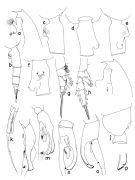 issued from : T. Park in Bull. Scripps Inst. Oceanogr. Univ. California, San Diego, 1995, 29. [p.120, Fig.10]. Female: a, forehead (left side); b, urosome (left); c, d, e, f, genital somite (left, dorsal, right, ventral, respectively); g, P1 (anterior); h, P2 (anterior). Nota: Laterally, forehead with high frontal eminence and long, slender rostrum, slightly curved backward and pointing downward. Dorsally and ventrally, genital somite strongly asymmetrical with a broad swelling on proximal half of left side and a large winglike outgrowth on distal half of right side. Lateral side of this winglike outgrowth bearing a small digitiform process. Genital flanges also strongly asymmetrical, right flange much larger than left. Cephalosomal appendages and swimming legs closely resembling those of E. concinna. Male: i, forehead (left); j, last pedigerous and genital somites (left); k, right P5 (anterior, protopod omitted); l, exopod of left 5th leg (anterior); m, idem (anterior, tilted clockwise); n, idem (medial); o, idem (lateral); p, distal end of serrated lamella (anterior).
|
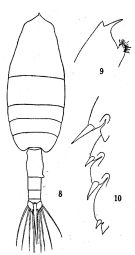 issued from: Q.-c Chen & S.-z. Zhang in Studia Marina Sinica, 1965, 7. [Pl.16, 11-13]. Female (from E China Sea): 11, habitus (dorsal); 12, forehead (lateral); 13, outer marginal spines of 2nd and 3rd exopodal segments of left P2 (posterior).
|
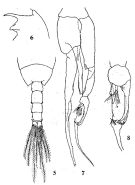 issued from : Q.-c Chen & C.-j. Shen in Studia Marina Sinica, 1974, 9. [p.128, Figs.5-8].Male: 5, last thoracic segment and urosome (dorsal); 6, forehead (lateral), 7, P5; 8, exopod of left P5 (medial).
|
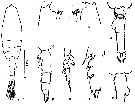 issued from : Z. Zheng, S. Li, S.J. Li & B. Chen in Marine planktonic copepods in Chinese waters. Shanghai Sc. Techn. Press, 1982 [p.36, Fig.21]. Female: a, habitus (dorsal); b, forehead (lateral); c, urosome (lateral, left side); d, idem (ventral); e, P2; f, portion of exopodal segments 2 and 3 of P2; g, urosome (dorsal, another specimen); h, forehead (lateral, another specimen). Scale bar in mm.
|
 issued from : T. Mori in The pelagic Copepoda from the neighbouring waters of Japan, 1937 (2nd edit., 1964). [Pl.18, Figs.10-14]. Female: 10, 12, habitus (dorsal and lateral, respectively); 11, A1; 13, P2; 14, genital segment (ventral).
|
 issued from : G.D. Grice in Fish. Bull. Fish and Wildl. Ser., 1962, 61. [p.202, Pl.14, Figs.14-20]. Female (from equatorial Pacific): 14-15, habitus (dorsal and lateral, respectively); 16, P2. Nota: Genital segment with a large protrusion on the right side from which arises a smaller spine-like process. Nota from Bradford & al. (1983, p.42): - P2 exopod female: Aa ± AB; Bb = 2/5 BC; Cc = 2/7 CD; Dd = 2/7 CD. (see code of lengths outer spines in the Genus' figure, or in Paraeuchaeta sp. A).
Male: 17-18, habitus (dorsal and lateral, respectively); 19, exopod of P2; 20, terminal part of left P5
Nota: In the Museum specimen identified by Sars, a small spine is present on the superiorlateral margins of the 5th thoracic segment (as is also found on the male of E. indica, I probably overlooked these spines in the Pacific specimen (not shown in the figure given of the male: fig.18.
Nota from Bradford & al. (1983, p.42): P2 exopod male: Aa = 1/4 AB; Bb = 1/4 BC; Cc = 1/3 CD; Dd = 1/3 CD. (see code of lengths outer spines in the Genus' figure, or in Paraeuchaeta sp. A).
|
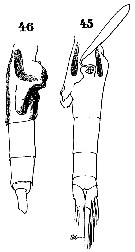 Issued from : W. Giesbrecht in Systematik und Faunistik der Pelagischen Copepoden des Golfes von Neapel und der angrenzenden Meeres-Abschnitte. - Fauna Flora Golf. Neapel, 1892, 19 , Atlas von 54 Tafeln. [Taf.37, Figs.45, 46]. As Euchäta longicornis. Female: 45, urosome with spermatophore (ventral); 46, urosome (lateral).
|
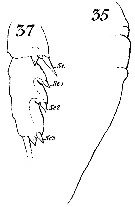 Issued from : W. Giesbrecht in Systematik und Faunistik der Pelagischen Copepoden des Golfes von Neapel und der angrenzenden Meeres-Abschnitte. - Fauna Flora Golf. Neapel, 1892, 19 , Atlas von 54 Tafeln. [Taf.16, Figs.35, 37]. As Euchäta longicornis. Female: 35, outer margin of Mx2; 37, exopodite 2 and 3 of P2 (posterior view)..
|
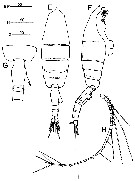 issued from : M.-K. Jeong, H.-L. Suh & H.Y. Soh in Ocean Sci., 2011, 46 (2). [p.124, Fig.5, E-H]. Female (E Korea): E-F, habitus (dorsal and lateral, respectively); G, genital double-somite; H, A1. Scale bars in micrometers. Nota: This species is distinguished by large fan shape lobe and an evident spine protruded on that lobe on right side of genital double-somite.
|
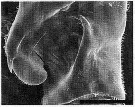 issued from : M.-K. Jeong, H.-L. Suh & H.Y. Soh in Ocean Sci., 2011, 46 (2). [p.128, Fig.8, I]. Scanning electron micrograph of female genital aperture in Euchaeta longicornis from E Korea, Japan Sea. Scale bar: = 0.050 mm.
|
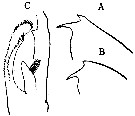 issued from : O. Tanaka in I O B C Handbook, 1973, IV. [p.133, Fig.3]. Female (from Central Indian Ocean): A, forehead (lateral). Male: B, forehead (lateral); C, serrated plate on the 2nd segment of left P5. Nota: The serrated plate on the 2nd segment of left P5 shows a different form from that figured by Giesbrecht (1892) according to the directions in which the plate was observed; it is not continuously serrated around the plate but is devoid of denticles near the inner distal margin as shown by the figures
|
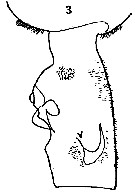 issued from : O. Tanaka in I O B C Handbook, 1973, IV. [p.148, Fig.9: 3]. Female: 3, genital segment (lateral, left side). Nota: Genital segment asymmetrical, longer than the following three segments together. The left side with a backward pointing process.
|
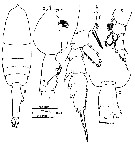 issued from : Mulyadi in Published by Res. Center Biol., Indonesia Inst. Sci. Bogor, 2004. [p.70, Fig.39]. Female (from 07°29'S, 121°05'E): a, habitus (dorsal); b, forehead (lateral); c, posterior part of last thoracic segment and genital complex (lateral right side); d, same (dorsal); e, P1; f, P2.
|
 Euchaeta longicornis Euchaeta longicornis Female: 1 - See Key to concinna species Group. 2 - Dorsally, genital somite asymmetrical with conspicuous outgrowth on right side (Fig.10-d); 3 - Dorsally, genital somite with winglike outgrowth on right side (Fig.10-d).
|
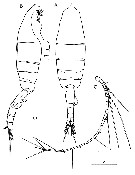 Issued from : H.Y. Soh, S.Y. Moon & J.H. Wi in Invertebrate Fauna of Korea (eds) Incheon: NIBR, 2013, 21 (28). [p.25, Fig.10]. Female (from Korean waters): A-B, habitus (dorsal and lateral, respectively); C, A1. Scale bars: 500 µm.
|
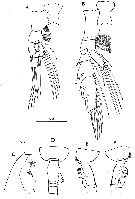 Issued from : H.Y. Soh, S.Y. Moon & J.H. Wi in Invertebrate Fauna of Korea (eds) Incheon: NIBR, 2013, 21 (28). [p.26, Fig.11]. Female: A, P1; B, P2; C, forhead (lateral); D-F, last thoracic segment and genital segment (dorsal, left and right sides, respectively). Scale bars: 200 µm.
| | | | | Ref. compl.: | | | Cleve, 1904 a (p.190); Sewell, 1948 (p.391); Ahlstrom & Thrailkill, 1963 (p.57, Table 5, abundance); De Decker & Mombeck, 1964 (p.12); Furuhashi, 1966 a (p.295, vertical distribution in Kuroshio region, Table 9, 10); Fleminger, 1967 a (tabl.1); Itoh, 1970 a (p.4: tab.1); Morris, 1970 (p.2300); Timonin, 1971 (p.281, trophic group); Björnberg, 1973 (p.386); Timonin, 1976 (p.79, vertical distribution); Carter, 1977 (1978) (p.35); Timonin & Voronina, 1977 (p.290, fifg.7); Arashkevich & al., 1982 (p.477, Table 2, diet); Dessier, 1983 (p.89, Tableau 1, Rem., %); Guangshan & Honglin, 1984 (p.118, tab.); Longhurst, 1985 (tab.2); Brinton & al., 1986 (p.228, Table 1); Chen Y.-Q., 1986 (p.205, Table 1: abundance %, Table 2: vertical distribution); Madhupratap & Haridas, 1986 (p.105, tab.1); Kotani & al., 1996 (tab.2); Hirakawa & al., 1990 (tab.3); Go & al., 1997 (tab.1); Jimenez-Perez & Lara-Lara, 1988; Cervantes-Duarte & Hernandez-Trujillo, 1989 (tab.3); Shih & Young, 1995 (p.70); Noda & al., 1998 (p.55, Table 3, occurrence); Mauchline, 1998 (tab.42); Suarez-Morales & Gasca, 1998 a (p.109); Hernandez-Trujillo, 1999 (p.284, tab.1); Lavaniegos & Gonzalez-Navarro, 1999 (p.239, Appx.1); Fernandez-Alamo & al., 2000 (p.1139, Appendix); Suarez-Morales & al., 2000 (p.751, tab.1); Hsiao & al., 2004 (p.326, tab.1); Lo & al.*, 2004 (p.218, fig.6); Lopez-Ibarra & Palomares-Garcia, 2006 (p.63, Tabl. 1, seasonal abundance vs El-Niño); Lavaniegos & Jiménez-Pérez, 2006 (p.143, tab.2, 3, Rem.); Hwang & al., 2006 (p.943, tabl. I); Hwang & al., 2007 (p.24); Dur & al., 2007 (p.197, Table IV); Jitlang & al., 2008 (p.65, Table 1); Morales-Ramirez & Suarez-Morales, 2008 (p.519); Ayon & al., 2008 (p.238, Table 4: Peruvian samples); Lopez Ibarra, 2008 (p.1, Table 1, 2, fig. 14: abundance); C.-Y. Lee & al., 2009 (p.151, Tab.2); Cornils & al., 2010 (p.2076, Table 3); Tutasi & al., 2011 (p.791, Table 2, abundance distribution vs La Niña event); Hsiao S.H. & al., 2011 (p.475, Appendix I); Hsiao & al., 2011 (p.317, Table 2, indicator of seasonal change); Tseng L.-C. & al., 2011 (p.47, Table 2, occurrences vs mesh sizes); Palomares-Garcia & al., 2013 (p.1009, Table I, abundance vs environmental factors); Mendoza Portillo, 2013 (p.37: Fig.7, seasonal dominance); Hwang & al., 2014 (p.43, Appendix A: seasonal abundance); Lopez-Ibarra & al., 2014 (p.453, Fig.8, Table 2, biogeographical affinity); Palomares-Garcia & al., 2018 (p.178, Table 1: occurrence). | | | | NZ: | 9 | | |
|
Carte de distribution de Euchaeta longicornis par zones géographiques
|
| | | | | | | | |  Issued from : G.A. Lopez-Ibarra, S. Hernandez-Trijillo, A. Bode & M.J. Zetina-Rejon in Cah. Biol. Mar., 2014, 55. [p.459, Fig.8]. Issued from : G.A. Lopez-Ibarra, S. Hernandez-Trijillo, A. Bode & M.J. Zetina-Rejon in Cah. Biol. Mar., 2014, 55. [p.459, Fig.8].
Abundance recorded in the geographic zones with the highest canonical coefficient on the first two axes of the discriminant analysis.
See informations and figures in Pleuromamma robusta from the same authors. |
| | | | Loc: | | | South Africa (E), Natal, Madagascar, Indian , Bay of Bengal, W Australia, Indonesia-Malaysia (Moluques), Flores Sea, SW Celebes, China Seas (East China Sea, South China Sea), Raiwan Seraie, Taiwan (S, SW, N, NW, Kuroshio Current), Okinawa, S Korea, Japan (Kuchinoerabu Is., Izu, Onagawa, Toyama Bay), Bikini Is., off N Hawaii, Pacif. (equatorial, Pacif. (E & W equatorial), Australia (Great Barrier), Fidji, New Zealand, California, W Baja California, Bahia Magdalena, Gulf of California, La Paz, G. of Tehuantepec, W Mexico, off W Guatemala, W Costa Rica, W Colombia , off Galapagos, off Peruvian coast, Pacif. (SE tropical), N Chile | | | | N: | 84 | | | | Lg.: | | | (3) F: 3,32-2,72; M: 2,88-2,52; (34) F: 2,76-2,67; (35) F: 2,9; (47) F: 3,1; (63) F: 3,09; M: 2,91; (98) F: 3,29-2,49; M: 2,95-2,54; (99) F: 3-2,56; M: 3; (101) F: 2,92-2,65; M: 2,65; (137) F: 3,1; M: 2,65; (290) F: 2,7-2,8; (394) M: 2,58-2,55; (991) F: 2,72-3,32; M: 2,52-2,88; (1023) F: 2,64-2,86; (1106) F: 2,46-2,73; (1125) F: 3,2; (1174) F: 2,46-2,73; {F: 2,46-3,32; M: 2,52-3,00}
The mean female size is 2.848 mm (n = 25; SD = 0.2662), and the mean male size 2.719 mm (n = 12; SD = 0.1881). The size ratio (male : female) is 0.963 (n = 7; SD = 0.0839), or ± 96 %. In the samples, the sex ratio (female : male) is 1.875. | | | | Rem.: | epipelagic. 80-301 m at Station N-1 (SW Bösö, E middle Japan) from Furuhashi (1966 aà.
For Bradford & al. (1983, p.43) this species resembles P. concinna, but the female of the latter species has the posterolateral corners of the metasome posteriorly produced and an incision on the left side of the genital segment when view in dorsal view.
For Park (1995, p.18) the species belongs to ''concinna'' Group. This species was found, often in large numbers, off the west coast of America between 16°N and 12°S and off the Philippines and Japan between 4°N and 35°N.
For Itoh (1970 a, fig.2, from co-ordonates) the Itoh's index value of the mandibular gnathobase = 730.
Timonin (1971, p.282) considers the trophic interrelations in the equatorial and tropical Indian Ocean, and divides the plankters into 6 trophic groups from the litterature and the results of studies of mouth-parts structure and intestine content. This species is a seizing and masticating carnivorous.
See in DVP Conway & al., 2003 (version 1) | | | Dernière mise à jour : 04/12/2020 | |
|
|
 Toute utilisation de ce site pour une publication sera mentionnée avec la référence suivante : Toute utilisation de ce site pour une publication sera mentionnée avec la référence suivante :
Razouls C., Desreumaux N., Kouwenberg J. et de Bovée F., 2005-2025. - Biodiversité des Copépodes planctoniques marins (morphologie, répartition géographique et données biologiques). Sorbonne Université, CNRS. Disponible sur http://copepodes.obs-banyuls.fr [Accédé le 28 novembre 2025] © copyright 2005-2025 Sorbonne Université, CNRS
|
|
 |
 |



















